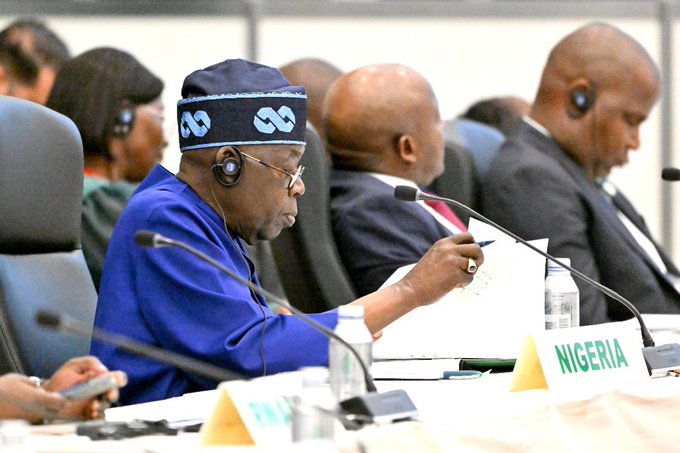Nigeria’s federal government has unveiled a new campaign to promote locally made goods and services under its ‘Nigeria First’ policy. President Bola Tinubu said the initiative will revitalise the country’s manufacturing sector and reduce its long-standing dependence on imports.
Announcing the initiative at the Adeola Odutola Lecture organised by the Manufacturers Association of Nigeria (MAN), President Tinubu, represented by John Enoh, Minister of State for Industry, Trade and Investment, said the campaign aims to shift national demand toward Nigerian-made products that meet international quality standards.
“No country achieves prosperity or dignity without producing what it can and exporting at scale what it does best,” Tinubu said. “Economic resilience begins in the factory and thrives in the marketplace. We are committed to reducing structural costs and enabling our manufacturers to compete effectively both at home and abroad.”
Read Also:
Yobe leads Nigeria’s first integrated six-disease health campaign
Certificate Forgery: Experts fault Nigeria’s leadership recruitment, vetting system
Tinubu’s reforms stabilising Nigeria’s economy , APC governors
Under the new framework, the government has pledged six key policy actions, including reforms to federal procurement, stricter quality and standards enforcement, expanded export support, improved access to finance, and investments in logistics, energy and skills development.
Industry Leaders Welcome Policy – But Demand Action
Industrialists have largely welcomed the ‘Nigeria First’ vision, but many warn that its success will depend on political will and consistent implementation. Aliko Dangote, Africa’s richest man and president of Dangote Group, said the initiative must become a “durable national strategy” that can withstand political cycles and market pressures.
“The Nigeria First policy represents a bold opportunity to industrialise sustainably,” Dangote said, in remarks delivered by Mansur Ahmed, former MAN president. “Its success depends on clear legislation, institutional enforcement, stable implementation and strong alignment across government and industry.”
MAN president Francis Meshioye also praised the initiative, calling effective legislation and enforcement “crucial for national economic survival.”
“Practice What You Preach,” Say Critics
Despite the fanfare, the policy has already come under fire from manufacturers and economists who accuse the government of failing to lead by example.
Reports show that several ministries and federal agencies continue to purchase imported vehicles and equipment, bypassing Nigerian manufacturers such as Innoson Vehicle Manufacturing (IVM) and Nord Motors — both of which produce locally assembled cars, buses and military vehicles.
“Innoson and other Nigerian manufacturers can meet domestic needs if the government gives them a fair chance,” said Innocent Chukwuma, chairman of the Innoson Group. “It makes little sense to preach ‘Buy Nigerian’ yet drive cars made abroad.”
Economist Dr. Bismarck Rewane added that government patronage would send a powerful message to the private sector: “If federal ministries and security agencies used vehicles made in Nnewi or Lagos, it would show that Nigeria believes in its own potential.”
A Persistent Gap Between Policy and Practice
Nigeria’s reliance on imports continues to drain its foreign reserves and weaken its manufacturing base. Despite being Africa’s largest economy, the country spends billions each year importing vehicles, industrial machinery and consumer goods that could be produced domestically.
Policy analyst Kayode Thomas described the contradiction as “a recurring national habit.”
“You cannot grow local industry while spending public money on imported alternatives,” he said. “The government should be the biggest customer of local manufacturers, not the biggest importer.”
Economist Dr. Ifeoma Nwosu from the University of Lagos echoed this concern, warning that unless the government begins to “use what it produces,” the Nigeria First campaign risks becoming another well-meaning slogan without tangible impact.
As inflation eases and international lenders such as the IMF forecast stronger growth for Nigeria in the coming years, the Tinubu administration faces mounting pressure to turn reform rhetoric into real industrial progress.
For many business leaders, the solution is straightforward: start at home. “If the Presidency, the National Assembly, and the Armed Forces all drove Innoson vehicles,” one industry insider said, “the rest of the country would follow.”



